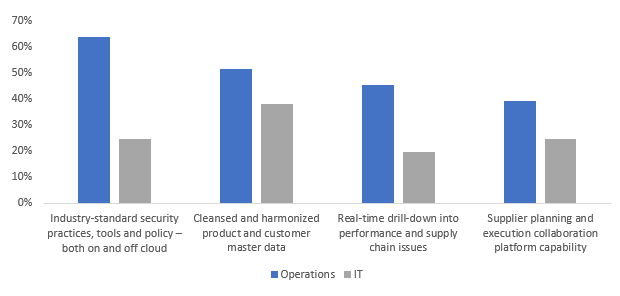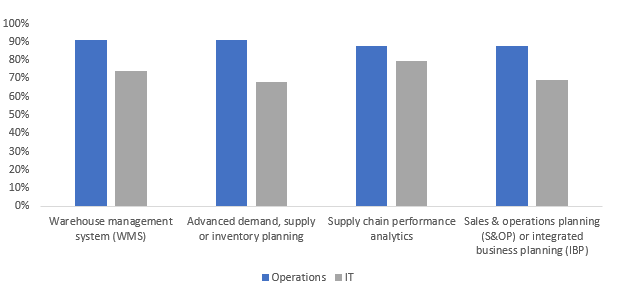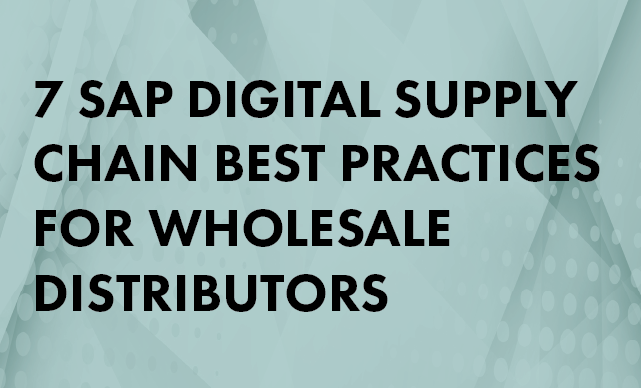How Do Operations and IT Approach the Digital Transformation of the Supply Chain Differently?
New SAPinsider research provides insight into the differing perspectives of the business view and IT view of supply chain digital transformation.
SAPinsider recently published a report titled, “Transforming the Intelligent Supply Chain,” which benchmarks the leading SAP customers in supply chain management on their progress in digital transformation in the supply chain.
Digitally transforming the supply chain involves a range of technical and strategic considerations. In this case, digital transformation of the supply chain means multiple departments and functions practicing agile innovation in a flexible manner and at a competitive pace. To gain this ability, organizations need to build on a foundation of cleansed and harmonized data with performance analytics and other analytics tools on a collaboration platform before experimenting with newer technologies such as IoT for real-time drilldowns into issues or AI for predictive analytics. From there, companies can use these technologies to lower logistics costs by catching issues earlier and improving inventory planning.
SAPinsiders not only need to have access to cleansed and harmonized data, but also need the computing power and tools to process and secure that data. When it comes these capabilities, IT and operations have very different perspectives.
Explore related questions
Here, we look at how survey respondents have and will approach these considerations, including the top requirements identified for digital transformation of the supply chain, the technologies in which they intend to invest, and how IT and operations view them differently.
Top Requirements for Transforming the Supply Chain
A close look at the data by respondent function revealed a few notable differences between IT professionals and SCM operations managers (see Figure 1). In general, SCM operations managers have a far more optimistic view of their organizations’ current capabilities.
Figure 7: Key capabilities currently used in SCM projects prioritized
by function
Source: SAPinsider, October 2019
A full 64% of operations managers claimed their organizations currently used industry-standard security practices, tools, and policy, while only 25% of their counterparts in IT claimed the same. The SCM operations managers also had a rosier view of the state of their data, with a slight majority of 52% claiming to work with cleansed and harmonized product and customer master data versus only 38% of IT professionals. Clearly the IT groups see much more room for improvement when it comes to security and data management.
Similar gaps appeared in ability to drill-down into issues in real-time and supplier planning and execution collaboration. In these cases, the operations folks likely have a more accurate view of their organizations’ capabilities. In all these cases, IT professionals and SCM operations managers need to communicate and align better on the reality of their situations.
How Do IT and Operations View SCM Technology Investments?
As illustrated in Figure 9, IT and operations professionals do not see eye when it comes to technology investment. They mostly agree on the importance of warehouse management systems and performance analytics, but operations managers see significantly more investment going to advanced demand, supply, and inventory planning and sales & operations planning or integrated business planning (IBP).
Figure 9: Technologies drawing investment by function currently and over the next two years
Source: SAPinsider, October 2019
SAP initially introduced SAP IBP as a new Advanced Planning System (APS) that empowered supply chain planners to better collaborate with finance, marketing, product development, engineering, manufacturing, etc. As SAP executed on the SAP IBP roadmap, it overlapped more with SAP Advanced Planning & Optimization (APO) until SAP IBP essentially replaced SAP APO as its primary APS offering. SAP IBP differs from SAP APO in that users access it via the cloud; it integrates deeper with SAP HANA; it has a web interface; it manipulates data in Microsoft Excel; it provides more advanced analytics, forecasting and simulation, and it has its own demand-driven material resource planning (DDMRP) app.
It seems that operations professionals see the value of SAP IBP and advanced planning capabilities much more clearly than their IT counterparts. Managers from each of these groups should align regularly to ensure IT understands the operational needs and priorities, and operations works within secure and harmonized data management systems that empower the organization to scale technology applications and maximize their value.
What Does This Mean for SAPinsiders?
Our findings Reveal the following key takeaways when it comes to how to approach a digital transformation of the supply chain:
- Ensure the right people in the organization have access to large volumes of the appropriate high-quality data in real time. This data empowers the organization to implement the higher-level applications based on the data — respondents chose cleansed and harmonized product and customer master data as the most important requirement for implementation, with 84% saying they either currently use this capability or plan to use it in the next two years.
- SCM operations managers and IT professionals should align on their organizations’ current capabilities. IT professionals and SCM operations managers need to communicate and align better on the reality of their situations. Operations managers tend to have a more optimistic outlook. While they may have a deeper understanding of the operations capabilities, they likely do not have the strengths they claim in security and harmonized data.
- IT and operations do not see eye-to-eye on future technology investments. They mostly agree on the importance of warehouse management systems and performance analytics, but operations managers see significantly more investment going to advanced demand, supply, and inventory planning and sales & operations planning or integrated business planning (IBP).
- Actual supply chain managers expect their companies to implement more advanced supply and operations planning tools. The professionals that manage operations see the value of IBP and advanced planning capabilities much more clearly than their IT counterparts.
Following this strategic guidance should help SAP customers get the most out of operational data in a way that leverages intelligent technologies to improve performance and accelerate growth.
Make sure to download and read the full report, available for free for SAP customers and the general population.
SAPinsider will host its Intelligent Customer-Driven Supply Chain conference in Orlando, Fla., November 6-8, 2019.
Pierce Owen, VP, Research, SAPinsider, can be reached at Pierce.Owen@wispubs.com.










